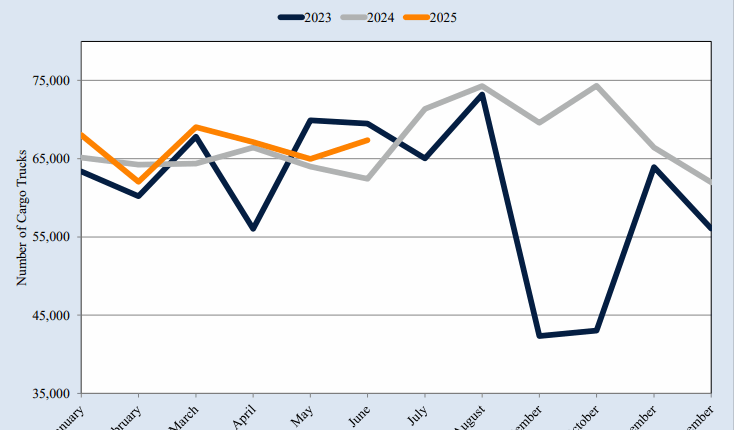Share this @internewscast.com
EL PASO, Texas (Border Report) – Despite the U.S. State Department’s temporary halt on issuing work visas to foreign truck drivers, the transportation of goods and parts from Juarez’s maquiladoras to El Paso hasn’t been significantly affected, according to industry insiders.
However, this action is creating confusion and could potentially increase costs, worsen the labor shortage, and cause delivery delays within the U.S. if it continues, they warned.
On August 21, Secretary of State Marco Rubio announced an immediate suspension of work visas for commercial truck drivers.
The decision followed the arrest of an undocumented Indian migrant, who allegedly obtained a commercial driver’s license in California and faced charges of vehicular homicide in Florida after making an illegal U-turn.
“The growing number of foreign drivers on U.S. roads presents risks to American safety and threatens the livelihoods of U.S. truckers,” Rubio stated on X.
According to Juarez trucking executive Manuel Sotelo, most Mexican truckers transporting goods through the El Paso and New Mexico border entries have not been required to have work visas. These drivers typically return to Mexico promptly, with some completing as many as two to three trips daily.
The two countries set rules under the North American Free Trade Agreement – later replaced by the U.S.-Mexico-Canada Agreement (USMCA) – on when Mexican drivers can come into “commercial border zones” and under what circumstances they can travel beyond those areas.
“The Mexican operators, whom we only use locally, don’t need a work permit. They have a (Border Crossing Card), the one all of us have in case we want to cross into the United States,” Sotelo said.
Mexican drivers working in the interior of the United States are typically recruited by American companies to deliver cargo between major U.S. cities.
‘They are ones with (visas) … so, the impact will be on American companies that have to move their merchandise about,” Sotelo said.
Marcelo Vasquez Tovar, regional director of the National Importers and Exporters Association in Mexico, said Rubio’s announcement has caused confusion among truckers and adds uncertainty to transportation businesses already coping with stricter English-only rules when they cross the border.

Trucking companies are spending on English teachers, taking drivers off the road so they can attend classes, and repurposing offices as classrooms.
“It’s a number of things, visas are pauses and the English requirement is adding to costs,” Vasquez told Border Report. “Unfortunately, what will happen is that our Mexican drivers will get stopped and deported. We are losing drivers who want to cross the border.”
Newsweek last month reported on a national trucking survey in which 69 percent of U.S. transportation and shipping company executives polled said a trucker shortage is limiting their ability to meet customer demand.











